Syria against the Palestinians. Israeli invasion of Lebanon
Surprisingly, Arab Syria formally entered the Lebanese war at the call of the Maronite Christians. When the military advantage was on the side of the left-wing Muslim forces, they also turned to Syria for help (earlier Damascus supported the Muslims by sending Palestinian units based in Syria). The head of the Christian police squads, Bashir Gemayel, hoped that Syria would help him get rid of the actual occupation of Lebanon by the Palestinians. However, Damascus had its own plans for the Lebanese state. The Syrians, not without reason, considered a significant part of Lebanon historical part of their state. Also, the loss of the Golan Heights put Syria in an extremely disadvantageous military-strategic position in relation to Israel. The deployment of Syrian troops in Lebanon would make it possible to somewhat improve the balance of power between Syria and Israel. In addition, Hafez al-Assad did not want victory either of the left, the strengthening position of the Palestinians, or the right, planning to restore equilibrium in the country and the region as a whole.
The 12 thousandth Syrian corps entered Lebanon in April 1976. Intervention allowed Syria to become the country's main political force. Gradually, the Syrian military presence was increased to 30 thousands of people. Leaders of the Lebanese Christian community supported the actions of Syria and the Christians met the Syrian troops as liberators. The United States also did not oppose such intervention by Syria. Jumblatt’s desperate attempt to negotiate, through the mediation of the newly elected President of Lebanon, Elias Sarkis, about national reconciliation with Christians and a joint action against the Syrian forces did not lead to success. Jumblatt’s appeals to other Arab states and France to assist in the fight against the Syrian troops were also unsuccessful.
Syrian troops entered Lebanon and began to advance towards Beirut, lifting the blockade around the surrounding Christian villages. Fierce battles between Syrians and Palestinians took place. Syria was not stopped even by the numerous mediation efforts of various Arab countries, dissatisfied with the union of Damascus with Christians and the fighting of the Syrians against the PLO. 7 June Syrians attacked the Palestinian-controlled suburbs of Beirut. Palestinians are defeated. Palestinian militants abduct in Beirut, the American ambassador, the embassy counselor for the economy and the driver of the embassy. All abducted were executed. The US evacuates embassy personnel from Beirut.
Thus, the open intervention of Syria radically changed the situation in Lebanon. Falangist Christians launched a counterattack. A large-scale battle for Tal Zaatar begins - the largest Palestinian refugee camp in the Beirut district of Dekvane. About 15 thousand people lived in the camp, including the garrison of 2,5 thousand militants. The camp was originally located in the industrial zone, so by the beginning of the battle the Palestinians easily turned it into a real fortified area. 22 June 1976 began the siege of the camp, which lasted 2 month.
The main forces of the Christians were the formations of the Guardians of the Cedars (led by Etienne Sakr), the Tigers of Akhrar (Dani Chamoun), and El-Tanzim (George Advan). Total 2 thousand soldiers. The Palestinians sent troops from the south of the country, trying to break the blockade ring, but could not succeed. 29 Jun. Christian troops are taking by storm the small Palestinian camp Jisr Al-Bash, located near Tal Zaatar. 5 July Palestinians stormed the Christian cities of Kura and Cecca in northern Lebanon. Having removed part of the troops from the siege of Tal Zaatar, the Christians literally at the last moment manage to save the population of these cities from the massacre. The Palestinians, meanwhile, are moving their troops from the south of the country, but they are unable to break the blockade around Tal Zaatar.
8 July 1976. The Palestinians and their allies make another attempt to break through the blockade of the camp. Jumblatt's troops strike at Christians in the area of the Beirut port and business city, while Palestinians are trying to break the ring around the camp. However, this attempt fails. July 13 Palestinian sniper from Tal Zaatara kills the Phalanx military wing leader William Xavi, who came to inspect his troops on the opposition line. As a result, the command of the Phalangist militia and the united Christian detachments is fully concentrated in the hands of Bashir Gemayel.
In mid-July - early August, with the support of the "Red Cross", the civilian population is evacuated from Tal Zaatar. Evacuation is accompanied by armed provocations on both sides. By early August, the Red Cross reported that 90% of the civilian population of the camp had been evacuated. Most of them are settled in the former Christian Damur. On August 6, the Phalangists took control of the Shiite district of Beirut Nabaa, through which the Palestinians are trying to break through from Tal Zaatar. They offer the enemy to capitulate to save the civilian population. Palestinians refuse. Arafat promises to turn Tal Zaatar into Stalingrad. 12 August after a fierce assault, Christians take the camp Tal Zaatar. Christian militants are taking revenge on Palestinians for the slaughter in Damur, they do not take prisoner either militants or civilians who remained: about 2 thousand people were killed and 4 thousand wounded. At the same time, Falangists with bulldozers are demolishing the camp in order to prevent its re-settlement by the Palestinians. In their cruelty, the sweep Tal Zaatara surpassed the massacre at Damur.
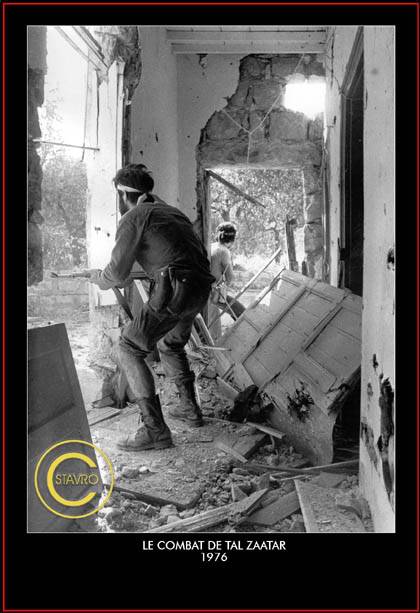
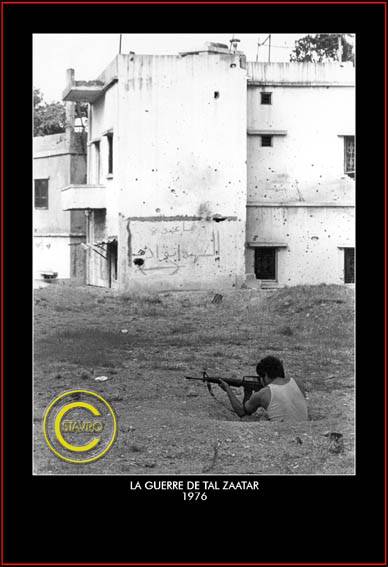
Fights in Tal Zaatar
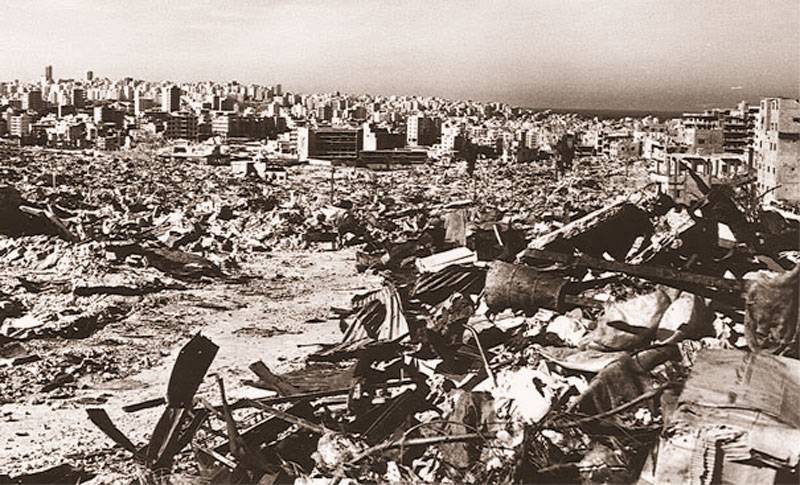
Ruined Tal Zaatar
Palestinians and detachments of Jumblatt are taking revenge. 17 August they begin rocket and artillery shelling of Beirut. More 600 volleys turn the capital of Lebanon into hell. However, in August and September, Syrian troops continued to crowd the Palestinians, already in the north of Lebanon. Now the PLO is in a hopeless situation. As a result, by October 1976, the Syrian troops brutally suppressed all Palestinian groups and established control over the entire territory of Lebanon. This forced Arab countries to intervene in the course of the civil war, which were extremely dissatisfied with the actions of Damascus. It is worth noting that, as in the present, Arab unity was only an appearance. Several countries claimed regional leadership (in particular, Egypt, Syria, Saudi Arabia). Therefore, the strengthening of the position of Damascus in Lebanon irritated the rest of the Arab countries.
In early October, meetings of almost all parties to the Lebanese conflict were held in France and Saudi Arabia. Lebanese President Elias Sarkis, Egyptian President Anwar Saddat, Syrian President Hafez Asad, Emir of Kuwait, King of Saudi Arabia, Gemayel, Kamal Jumblat, and PLO leader Yasser Arafat met at the negotiating table. The parties agreed on a truce, the withdrawal of Syrian troops, the entry of Arab peacekeeping forces, the establishment of permanent Arab forces to maintain stability in Lebanon. During the year, the clauses of the agreement were mainly implemented. The “green helmets” of the Arab peacekeeping forces occupied all the territories, except for the southern regions of Lebanon controlled by Saad Hadad’s army. At the same time, the Arab peacekeeping forces mainly consisted of Syrians (85% of troops). That is, the Syrians have maintained their position in Lebanon.
Thus, the first stage of the war in Lebanon ended. During the two years of the war only 60 thousand people were counted dead. The infrastructure of the country was destroyed. Prosperous "Middle Eastern Switzerland" is a thing of the past. The Lebanese capital Beirut was in ruins, two thirds of its pre-war population of one and a half million left it. The Palestinian forces and the NPS unit were defeated. Despite the fact that in some places clashes continued, by the beginning of the new year most of the Palestinian and Lebanese groups laid down heavy weapons. Beirut was divided into the western part (Palestinians and Muslims) and the Eastern part (Christians). The Union of Christian Parties “Lebanese Front” significantly strengthens its position, and its united army “Lebanese Forces” under the command of the young leader Bashir Gemayel gradually becomes a powerful force.
December 4 1976 tried to kill the leader of the Lebanese Druze and one of the main leaders of the left movement of Lebanon, Jumblatt. 4 killed, 20 man injured. Kamal himself was still alive. The leader of the left Muslim forces (NPS) Kamal Jumblat was shot 16 March 1977 in his car between the settlements of Baaklin and Deir-Durrit in the district of Shuf, south-east of Beirut. In response, the Druze massacred Christians in areas adjacent to the site of the murder, destroying civilians according to various sources from 117 to 250. The village of Deir Durrit was razed to the ground. In Christian areas, the news of Jumblat's death was greeted with glee. This is not surprising. Jumblata in Lebanon was hated by many. If in Beirut and other parts of Lebanon the Druze formations supported the Palestinians, in the mountainous Lebanon, in the places of the original residence of the Druze, they “cleaned” the territory from everyone they could get. Not only Christians were slaughtered, but Palestinians, Sunnis and Shiites. Ethno-confessional massacre in Lebanon was common then. Jumblatt "got" many already, and he would be happy to be eliminated by representatives of a number of groups.
As a result, the NPS block finally collapses. Syrians were suspected of killing Jumblat. Shortly before his death, Jumblat began recklessly to come out with aggressive attacks on the Alawite leadership of Syria, declaring a Sunni-Alawite conflict and an alliance of Alawites with Lebanese Maronite Christians.
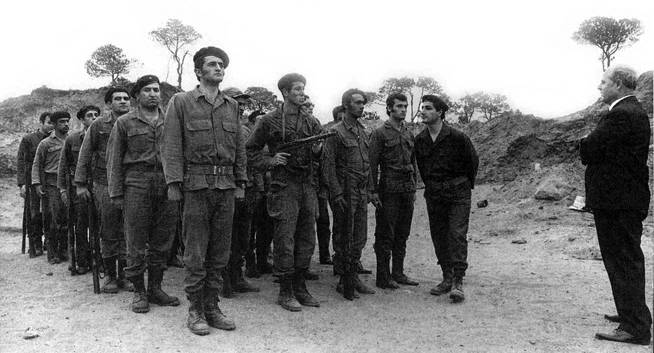
Fighters Christian "Phalanx"
The second stage of the Lebanese war. Israeli intervention
It seemed that the war was over and the world would be long. 1977 year became a time of respite. The country is slowly moving away from the war. Embassies of various countries of the world return to Beirut. So, the US returns its embassy to Beirut. Famous artists Charles Aznavour, Julio Iglesias, Demis Rusos, Joe Dassin and Dalida perform in the destroyed Beirut with concerts. In summer, the first groups of tourists arrive in Lebanon.
However, the Big Game continued in the Middle East. The United States did not want to strengthen the position of Syria (an ally of the USSR) in the region. Israel was dissatisfied with the outcome of the war: Syria gained too much influence in Lebanon. Syria actually occupies the northern part of Lebanon, which it considers its territory. The Israelis did not want to tolerate the location of the Syrian troops in areas from which they could strike at the Jewish state bypassing the fortifications on the Golan Heights. At the same time, the Arab (de facto - Syrian) peacekeepers performed the functions of maintaining peace in the south of Lebanon formally - the attacks of the Palestinians against the Jewish settlements in the north of Israel did not stop. After the conclusion of a peace treaty with Egypt at 1976 in Camp David, the Israelis were counting on signing the same agreement with Lebanon. The problem was: with whom to sign it? Lebanese President Frangieu held the pro-Syrian position. The only suitable candidate for the role of Israel-friendly leader was Bashir Gemayel. Therefore, the Israeli government maintained contacts with Bashir Zhmeyel and strengthened his strength.
At the same time, Syria’s relations with the Christian parties, which demand the immediate withdrawal of the Syrian peacekeeping contingent, which has become essentially occupational, are deteriorating. Christians fear that the Syrians will remain in Lebanon for a long time and seize a part of the country. Lebanese Christian leaders begin covert collaboration with Israel, which supplies Christian troops weapons and technology, provides financial support. Militants of the Christian militia were trained in Israel. The United States is also arming the Christian militia by transferring weapons and equipment across the sea. In turn, Damascus is changing its tactics in Lebanon. Syrians are beginning to attract former opponents from the ranks of the collapsed NPS. Syrian troops are beginning to re-equipment of the Palestinian and Lebanese Muslim groups under their control.
7 February 1978, the Syrians from the Arab contingent of peacekeepers arrest the military leader of the Christian "Lebanese forces" Bashir Gemayel at a checkpoint in the Beirut district of Ashrafia. On the same day, the Syrians attack the Lebanese army barracks in Fedaya. The army has shown an unexpected strong resistance, as a result of which the Syrians lose 20 people killed and more 20 prisoners. Up until February 9, the Syrians, with the support of artillery, were attacking Lebanese army barracks. To help the Lebanese army comes the Christian militia "Tigers Ahrar." Dozens of dead on both sides. February 16 parties exchange prisoners. Skirmishes of phalangists with the PLO also began. The leaders of the Christian community announce that henceforth the Syrian army in Lebanon is occupying and demanding its withdrawal. At the same time, the leadership of the Lebanese Front split on the Syrian presence in Lebanon. As a result, Suleiman Frangieu left the pro-Syrian mood.
However, relatively small and scattered Christian units could not resist the Syrian army and Palestinian units. Christians needed direct support from Israel to create a buffer zone in southern Lebanon, where there would be no PLO units and a regular pro-Israel Lebanese army could be created. Ariel Sharon, then Minister of Defense of Israel, still in the middle of 1970, insisted on creating a buffer zone in 15 miles north of the border with Lebanon along the Litani River.
All that was needed was an excuse to invade Lebanon. He soon appeared. On March 11, 1978, Palestinian militants land on the coast near the Israeli city of Haifa, seize a regular bus and move along the highway to Tel Aviv, shooting civilians from the windows of the bus. As a result, 37 Israeli civilians became victims. Then, Israeli troops eliminated the terrorists. In response, Israel begins the military operation "Litania", which lasted three months. March 15, 25 thousand Israeli group supported aviation, artillery and tanks invades southern Lebanon and pushes the Palestinian troops north of the Litani River. The cities of Kuzai, Damur and Tire are bombarded. Lebanese and Palestinians lost between 300 and 1500 killed, while Israel's losses were minimal - 21.
As a result, Israeli troops occupied the southern part of Lebanon and transferred it under the control of the “Southern Lebanon Defense Army” (“Southern Lebanese Army”), led first by Major Saad Haddad and then by General Antoine Lahad. This army was formed with the support of the Israeli army in order to create a “buffer” between the Jewish state and forces hostile to it in the north. The preparation of the army, its equipment and maintenance was carried out directly by Israel. The “Army of Southern Lebanon” on 80% consisted of Christians. The rest were Shiite Muslims, as well as a small number of Druze and Sunni Muslims.
The UN sends UNIFIL blue helmets to Lebanon to control the withdrawal of Israeli troops and to promote the return of Lebanese sovereignty over southern Lebanon. Israel begins the gradual withdrawal of its troops, transferring control over the Christian "Army of Southern Lebanon" seized by Lebanese territory. In addition, Israel is holding the “red line” along the banks of the Litani River. Israel warns Syria that if the Syrian soldiers cross the “red line” the Israeli army will attack the Syrians. At the same time, units of the “Army of Southern Lebanon” attack UN peacekeepers. Later, the "blue helmets" came under attack and Palestinian troops. As a result, the peacekeepers could not restore Lebanese sovereignty in the south of the country.
Under the cover of the Israeli invasion, the Phalang detachments launched a large-scale offensive against their opponents. The war began with a new force. Thus, Syria, solving first of all its own military-strategic tasks, managed to stop the civil war in Lebanon in 1976. The world lasted almost 2 year. However, the actions of Israel and the Christian "Phalanx" led to a new round of conflict, which again escalated into a big war.
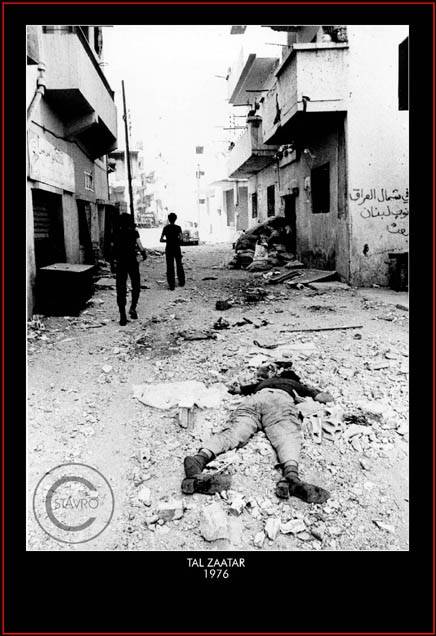
To be continued ...
- Alexander Samsonov
- Lebanon war
How did the Lebanese war of the year 1982 begin
How the Lebanese war began. H. 2
Information